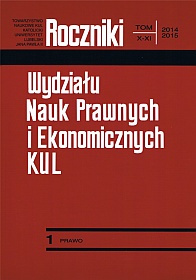Religious policy in Poland towards catechetical teaching in the years 1961-2001
Abstrakt
Polska polityka religijna wobec katechizacji w latach 1961-2001
Powszechna Deklaracja Praw Człowieka uchwalona przez Organizację Narodów Zjednoczonych w 1948 r. proklamuje prawa człowieka do wolności myśli, sumienia i wyznania. Deklaracja podkreśla, że prawo to obejmuje również wolność głoszenia swego wyznania lub wiary, bądź indywidualnie, bądź wespół z innymi ludźmi, publicznie i prywatnie, poprzez nauczanie, praktykowanie, uprawianie kultu i przestrzeganie obyczajów. Na wyraźne podkreślenie prawa człowieka do poznawania zasad wiary (zarówno w nauczaniu Kościoła, jak i oświadczeniach Organizacji Narodów Zjednoczonych) wpływ miały doświadczenia Kościoła w systemie totalitarnym w ostatnich dekadach, a zwłaszcza w systemie opartym na ideologii marksistowskiej. Taka właśnie była sytuacja, w jakiej od II wojny światowej do 1989 r. znajdował się w Polsce Kościół, stanowiący część organizmu społecznego, który był zmuszony koegzystować z ustrojem komunistycznym. Dlatego trudno było oczekiwać kompromisu czy – tym bardziej – przychylnej postawy ze strony władz państwowych wobec katechizacji w owym okresie. W czasach PRL prawo, akty i przepisy administracyjne służyły jako środek wzmocnienia rządów komunistycznych i podporządkowania im wszystkich sfer życia społecznego i państwowego. System prawny nie dawał żadnych gwarancji przestrzegania praw osoby ludzkiej i, co więcej, ograniczał on pradawne prawa Kościoła, w tym prawo do nauczania religii. Sytuacja uległa radykalnej zmianie po 1989 r., jako wynik transformacji politycznej, kiedy to totalitarny ustrój komunistyczny został zastąpiony ustrojem demokratycznym. Niniejszy artykuł obejmuje lata 1961-2001, to jest od momentu, gdy nauczanie religii zostało usunięte ze szkół, do promulgowania Dyrektorium katechetycznego Kościoła Katolickiego w Polsce.
Bibliografia
Czubiński A., Historia Polski XX wieku, Poznań 2000.
Dudek A., Państwo i Kościół 1945-1970, Kraków 1995.
Dudek A., Pierwsze lata III Rzeczpospolitej 1989-1995, Warszawa 1997.
Dudek A., Polityka władz Polski Ludowej wobec Kościoła katolickiego – trwanie i zmiana, [in:] Represje wobec osób duchownych i konsekrowanych w PRL w latach 1944-1989, ed. A. Grześkowiak, Lublin 2004, pp. 13-22.
Dudek A., Ślady PeeReLu. Ludzie, wydarzenia, mechanizmy, Kraków 2000.
Kamiński R., Podstawowe uwarunkowania życia i działalności Kościoła w Polsce, [in:] Kościół w czasach Jana Pawła II, eds. M. Rusecki, K. Kaucha, J. Mastej, Lublin 2005, pp. 239-258.
Krukowski J., Drzwi dla religii jeszcze zamknięte, “Ład. Tygodnik katolicki” from 11 March 1989, pp. 1 and 6.
Krukowski J., Kościół i Państwo. Podstawy relacji prawnych, Lublin 1993.
Krukowski J., Religia i wolność religijna w Polsce w procesie integracji Europejskiej, [in:] Materiały IV Międzynarodowej Konferencji na temat “Religia i wolność religijna w państwach europy środkowo-wschodniej w perspektywie integracji europejskiej”, Lublin, 1-2 września 2003, ed. J. Krukowski, Lublin 2004, pp. 93-109.
Krukowski J., Stanowisko Kościoła katolickiego w relacji do państwa w sprawie nauczania religii w szkołach, [in:] Nauczanie religii w szkole w państwie demokratycznym, ed. J. Krukowski, Lublin 1991, pp. 7 24.
Krukowski J., Warchałowski K., Polskie prawo wyznaniowe, Warszawa 2000.
Mezglewski A., Nauczanie religii w Polsce Ludowej, “Studia z Prawa Wyznaniowego” 2000, Vol. I, pp. 21-36.
Mezglewski A., Skierowanie do nauczania religii, “Studia z Prawa Wyznaniowego” 2000, Vol. I, pp. 37-47.
Misztal H., Konstytucyjne podstawy polskiego prawa wyznaniowego, [in:] Prawo wyznaniowe, eds. H. Misztal, P. Stanisz, Lublin 2003, pp. 188-206.
Misztal H., Okres 1945-1989, [in:] Prawo wyznaniowe, H. Misztal, P. Stanisz, Lublin 2003, pp. 128-174.
Raina P., Kościół w PRL. Kościół katolicki a państwo w świetle dokumentów, vol. I-III, Poznań 1994-1996.
Raina P., Ks. Jerzy Popiełuszko – męczennik za wiarę i Ojczyznę, vol. 1-3, Olsztyn 1990.
Roszkowski W., Historia Polski 1914-1991, Warszawa 1992.
Skórzyński J., “Solidarność” w drodze do Okrągłego Stołu. Strategia polityczna opozycji 1985-1989, [in:] Polska 1986-1989: koniec systemu, vol. I. Materiały międzynarodowej konferencji, Międzeszyn, 21st–23th October 1999, eds. P. Machcewicz, A. Dudek, A. Paczkowski, Warszawa 2002.
Skórzyński J., Ugoda i rewolucja. Władza i opozycja 1985-1989, Warszawa 1995.
Stanisz P., System źródeł prawa wyznaniowego, [in:] Prawo wyznaniowe, eds. H. Misztal, P. Stanisz, Lublin 2003, pp. 175-187.
Zieliński Z., Kościół w Polsce 1945-2002, Radom 2003.
Żaryn J., Dzieje Kościoła katolickiego w Polsce (1944-1989), Warszawa 2003.
Copyright (c) 2015 Roczniki Wydziału Nauk Prawnych i Ekonomicznych KUL

Utwór dostępny jest na licencji Creative Commons Uznanie autorstwa – Użycie niekomercyjne – Bez utworów zależnych 4.0 Międzynarodowe.

